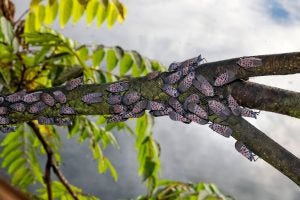The U.S. Department of Agriculture has declared April 2022 Invasive Plant Pest and Disease Awareness Month (IPPDAM). This national outreach month is dedicated to highlighting the impact invasive plant pests and diseases have on plant health nationwide and educates Americans about the simple actions they can take to help reduce their spread. Hungry, invasive pests threaten our nation’s food crops, gardens, and natural resources. IPPDAM aims to raise public awareness about the threat, which can devastate livelihoods, food security, and forests.
Many invasive plant pests and diseases are natural hitchhikers — making it easy for people to unintentionally move them to new areas. These nonnative pests can hide in untreated firewood, attach themselves to outdoor gear and vehicles, and take a ride in the mail. They can also hitch a ride to new areas on agricultural material such as soil, seeds, homegrown produce, and plants.

Invasive pests have few or no natural predators in their new environments and can quickly spread — disrupting ecosystems by pushing out native species and reducing biological diversity. Weather can magnify their impact. Climate change has increased the level of plant pest infestations and disease infection, allowed pests to produce more generations each year, and extended the suitable habitat for plant pests. To protect local ecosystems and our domestic food supply, it’s important to enlist the public in the effort to protect plant health. Together we can make a difference.
Here’s what you can do:
- Familiarize yourself with the invasive pests that are in your area, as well as the signs of their infestation on wild plants and agriculture.
- Look for signs of new invasive plant pests and diseases and report them to your local Extension office, State department of agriculture or your USDA State Plant Health Director’s office.
- When returning from travel overseas, declare all agricultural items, including seeds, soil, and handicrafts to U.S. Customs and Border Protection so they can ensure your items won’t harm U.S. agriculture or the environment.
- Don’t move untreated firewood — even if it looks pest-free on the outside. Buy local or use certified heat-treated firewood, or responsibly gather it on site where permitted. That avoids the unintentional spread of tree-killing beetles that hide in untreated firewood.
- Source your plants and seeds responsibly. When ordering online, don’t assume items available from foreign retailers are legal to import into the United States. U.S. regulations apply to the importer of record — meaning the person purchasing and importing the product from overseas—not the online merchant. Learn how to safely and legally order plants and seeds online.
- Don’t mail homegrown plants, fruits and vegetables. You may live in an area under quarantine for a harmful invasive plant pest. You could inadvertently mail a pest with your homegrown fruit, vegetables, seeds or soil.
- When in doubt, contact your local USDA State Plant Health Director’s office to find out what you need to do before buying seeds or plants online from an international vendor or before mailing your homegrown agricultural goods.
“As people start to spend more time outdoors this spring, we ask them to remain vigilant for signs of invasive pests, which begin to emerge as the temperatures rise,” said U.S. Secretary of Agriculture Thomas J. Vilsack. “Invasive insects and plant diseases cost the U.S. an estimated $40 billion a year in damages to plants we depend on. It’s important to do what we can to slow their spread and reduce the impact they have on our communities.”


